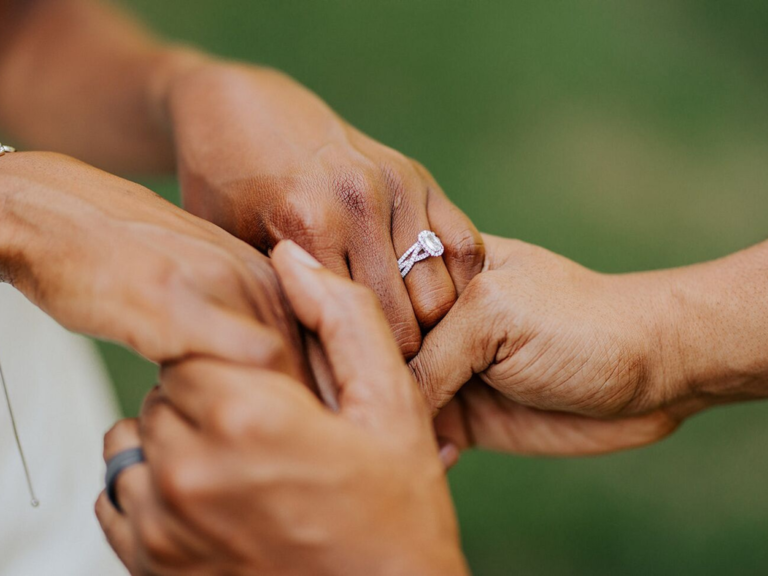What's the Average Engagement Length Right Now?
The duration of your engagement is entirely up to you. Some couples want to take their time, while others want to get married, like, yesterday. But what's the average engagement length in the US? The number might surprise you. We surveyed nearly 17,000 couples to get an idea of how long couples are waiting to wed (and how that number has changed over the past few years). We've also enlisted a relationship expert to share the benefits of both long and short engagements if you're on the fence about how long your engagement should last.
In this article:
- What Is the Average Engagement Length?
- Is There a "Normal" Length of Engagement?
- Pros of a Long Engagement
- Pros of a Short Engagement
What Is the Average Engagement Length?
How long do fiancés take to get married these days? According to The Knot 2025 Real Weddings Study, the average engagement length for US couples is 15 months. Of course, it's important to keep in mind that this number is a national average and takes into account a variety of responses. Some engagements are shorter (like a month, for example) while others last for years.
The average length of an engagement has held steady at 15 months since 2022. However, before that it had a bit of a roller coaster ride, due in no small part to the pandemic. The average engagement length was 16 months in 2021, 15 months in 2020 and 14 months in 2019. It's important to note that couples were waiting longer to wed in 2020 and 2021 due to COVID-related wedding postponements. At the time, those who postponed their weddings were engaged for an average of 24 months, which skewed the results. Thankfully, these postponements are a thing of the past, but the length of engagement has increased slightly in recent years. We're seeing couples take their time to plan a personalized and unique wedding, book their desired vendors well in advance and save more money due to inflation-related cost increases, so a longer timeline makes sense.
Wondering about how long couples are dating before getting engaged? Turns out the length of time couples date before the engagement varies widely. According to The Knot 2024 Jewelry and Engagement Study, which surveyed nearly 8,000 couples who got engaged in 2024, 30% of respondents dated for two years or less before getting engaged. Just over half (53% to be exact) dated for two to five years, while 17% dated for six or more years.
Is There a "Normal" Length of Engagement?
The 15-month average length of an engagement is just that, an average based on data collected from thousands of couples. But, in our expert opinion, how long should an engagement last? Here's the TL;DR: There's no such thing as a "normal" engagement length, and there's no "too long" or "too short" length of time to be engaged. Every relationship is different, and you and your partner should decide what's best for you. If you're debating whether a long or short engagement is better, you can certainly look to the average engagement length for guidance. But beyond that, there are a few things to consider when it comes to your time frame.
Pros of a Long Engagement
While the current average length of an engagement is 15 months, there are some benefits of having a longer engagement. If you and your partner are long-distance, busy with work or school, or would like more time to plan your celebration, a long engagement might be the best choice, according to experts.



"Long engagements are helpful when individuals are at significantly different places in their lives," says Scott Haltzman, M.D. So if you or your partner are still finishing school or living abroad at the moment, it might be better to start thinking about the wedding once you've completed those chapters in your lives. Then, your marriage can signify the start of a brand new one. Haltzman also says that a prolonged engagement gives couples extra time to engage in premarital education so that they can learn skills that help improve marriage.
One of the most common benefits of a longer engagement is it means having more time to save. Couples also reported that an extended engagement allowed them to do thorough research and find vendors who can bring their vision to life.
For some couples, those extra savings are important, as weddings can cost a fair amount of money. According to our Real Weddings Study, the average cost of a wedding is $33,000. Our data found that couples typically pay for about 50% of the wedding. Because of the cost, some couples require more time to save up for their nuptials.
A longer engagement also means taking more time to plan and organize logistics, especially if you're without a wedding planner and you're hiring a range of vendors. (Our internal data found that couples hired about 14 pros for their wedding day.) With the current wedding boom still very much in effect, a longer lead time will give you more options when it comes to selecting your wedding pros, as many vendors are booking up years in advance.
Another pro of a long engagement? More time to think about personalizing your wedding. More and more couples are adding thoughtful details to their big day for a unique experience. Our study found that 45% of couples provided unique guest entertainment, such as photo booths, special musical performers or games. If having sweet and special details like these are important to you, a longer engagement allows you more time to plan them.
Pros of a Short Engagement
If the national average engagement length seems too long for you, perhaps a short engagement is the best route. A brief engagement may work better for you if you're eager to make big life decisions (like having children or moving in together).
Another advantage of having a shorter engagement? You, your partner and your loved ones will be extra excited about your nuptials. "One of the problems with an extended engagement is the level of excitement begins to diminish over time, not only with the person who is engaged to get married, but with friends and families as well," Haltzman says. According to real nearlyweds, this is a major pro of having a short engagement. Some couples claimed a shorter engagement time meant they could really soak up all the excitement in a condensed time period.
An extra benefit of a short engagement period is that it gives you and your partner less time to stress out. Let's face it: While the wedding planning process can be fun, it can also be overwhelming. Less time spent planning can mean less time to worry about all the tiny details so you can focus more on your love for each other.
So, there are pros and cons for both a long engagement and a short engagement. Our advice? Don't stress too much about the average engagement length number. Do what makes sense for you and your partner—whether that's a three-month, six-month or three-year engagement—and enjoy this special time in your lives.
Maddy Sims contributed reporting to this article.





















